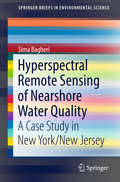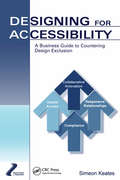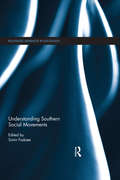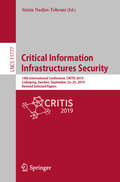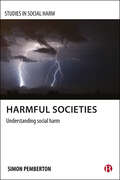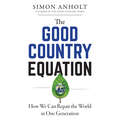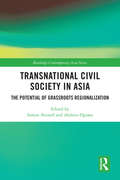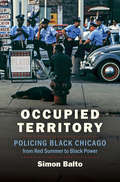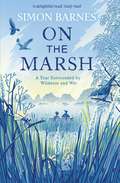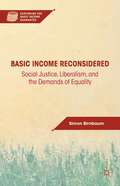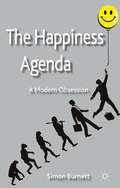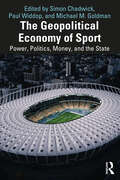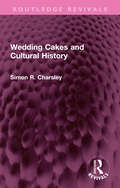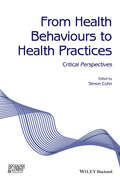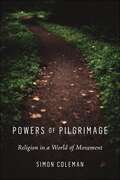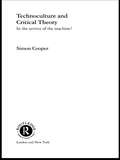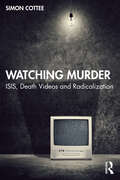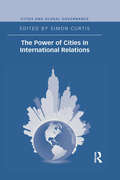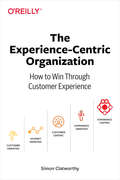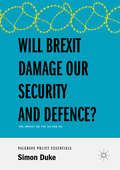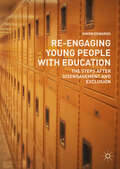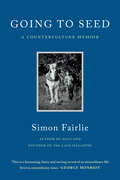- Table View
- List View
Hyperspectral Remote Sensing of Nearshore Water Quality
by Sima BagheriThis book provides details on of the utility of hyperspectral remote sensing - NASA/AVIRIS in nearshore water quality issues of NY/NJ. It demonstrates the use of bio optical modeling and retrieval techniques to derive the concentrations of important water quality parameters (chlorophyll, color dissolved organic matter and suspended sediments) in the study area. The case study focuses on the nearshore waters of NY/NJ considered as a valued ecological, economic and recreational resource within the New York metropolitan area. During field campaigns (1998-2001) measurements were made to establish hydrological optical properties of the NY/NJ nearshore waters with concurrent NASA/AVIRIS overflights. The field measurements included: 1) concurrent above and below surface spectral reflectance; 2) shipboard sampling for determination of inherent optical properties (IOP); and 3) concentrations of optically important water quality parameters. Understanding the relationship between reflectance, absorption and scattering is essential for developing the analytical algorithm necessary to use remote sensing as a monitoring /management tool in the nearshore environment.
Designing for Accessibility: A Business Guide to Countering Design Exclusion (Human Factors and Ergonomics)
by Simeon KeatesA step by step guide, this book covers how to design products that offer the right combination of functionality, usability, and accessibility for all consumers. The author articulates why these three elements can make the critical difference in remaining competitive and economically viable over the long term. He provides insightful case studies that illustrate the corporate benefits for designing accessibility, in addition to carefully selected and valuable figures and tables. Demystifying what is involved in designing inclusive products for all users, the book highlights numerous examples for designers, such as creating a tool for Web browsing for older adults, as well as digital television access.
Understanding Southern Social Movements (Routledge Advances in Sociology)
by Simin FadaeeSouthern social movements have played an important role in shaping world history and politics. Nevertheless, scholarly literature on movements of the global South remains limited and restricted to testing the social movement theory which was developed in the North. This Northern-centric approach largely fails to provide a meaningful understanding of Southern movements because it is not directly applicable to the differing historical backgrounds, culture and socio-economic structures found in the South. Much of the uniqueness and complexity of Southern social movements has therefore been overlooked. This collection analyses recent events and developments in Southern social movements, introducing well-researched case studies from fifteen countries of the global South. Arranged in two parts, the volume examines firstly movements which focus on rights and quality of life issues, and secondly the post-2011 wave of uprisings which started with Tunisian and Egyptian movements. Contributing to ongoing discussions about the Northern-centric nature of social movement theory and the social sciences more generally, the authors enter into dialogue with the debate on local and national levels, as well as globalizing processes. Through an interdisciplinary approach this book broadens the theoretical and empirical perspectives for the study of social movements and will appeal to sociologists, political scientists, scholars and students of social movements, and social activists.
Critical Information Infrastructures Security: 14th International Conference, CRITIS 2019, Linköping, Sweden, September 23–25, 2019, Revised Selected Papers (Lecture Notes in Computer Science #11777)
by Simin Nadjm-TehraniThis book constitutes the revised selected papers of the 14th International Conference on Critical Information Infrastructures Security, CRITIS 2019, held in Linköping, Sweden, in September 2019.The 10 full papers and 5 short papers presented were carefully reviewed and selected from 30 submissions. They are grouped in the following topical sections: Invited Papers, Risk Management, Vulnerability Assessment, Resilience and Mitigation Short Papers, and Industry and Practical Experience Reports.
Harmful Societies: Understanding Social Harm (Studies in Social Harm)
by Simon A. PembertonWhile the notion of social harm has long interested critical criminologists it is now being explored as an alternative field of study, which provides more accurate analyses of the vicissitudes of life. However, important aspects of this notion remain undeveloped, in particular the definition of social harm, the question of responsibility and the methodologies for studying harm. This book, the first to theorise and define the social harm concept beyond criminology, seeks to address these omissions and questions why some capitalist societies appear to be more harmful than others. In doing so it provides a platform for future debates, in this series and beyond. It will be a valuable resource for academics and researchers across criminology, sociology, social policy, socio-legal studies and geography.
The Good Country Equation: How We Can Repair the World in One Generation
by Simon AnholtWhy doesn't the world work? Why, despite all the power, technology, money and knowledge that humanity has accumulated, are we are still unable to defeat global challenges like climate change, war, poverty, migration, extremism, and inequality? Simon Anholt has spent decades helping countries from Austria to Zambia to improve their international standing. Using colorful descriptions of his experiences--dining with Vladimir Putin at his country home, taking a group of Felipe Calderon's advisors on their first Mexico City subway ride, touring a beautiful new government hospital in Afghanistan that nobody would use because it was in Taliban-controlled territory--he tells how he began finding answers to that question. Ultimately, Anholt hit on the Good Country Equation, a formula for encouraging international cooperation and reinventing education for a globalized era. Anholt even offers a "selfish" argument for cooperation: he shows that it generates goodwill, which in turn translates into increased trade, foreign investment, tourism, talent attraction, and even domestic electoral success. Anholt insists we can change the way countries behave and the way people are educated in a single generation--because that's all the time we have.
Transnational Civil Society in Asia: The Potential of Grassroots Regionalization (Routledge Contemporary Asia Series)
by Simon Avenell and Akihiro OgawaThis edited volume addresses how transnational interactions among civil society actors in Asia and its sub-regions are helping to strengthen common democratic values and transform dominant processes of policymaking and corporate capitalism in the region. The contributors conceive of transnational civil society networks as constructive vehicles for both informing and persuading governments and businesses to adopt, modify, or abandon certain policies or positions. This volume investigates the role of such networks through a range of interdisciplinary approaches, bringing together case studies on Asian transnationalism from South, Southeast, and Northeast Asia across four key themes: local transformations and connections, diaspora politics, cross-regional initiatives and networks, and global actors and influences. Chapters demonstrate how transnational civil society is connecting people in local communities across Asia, in parallel to ongoing tensions between nation-states and civil society. By highlighting the grassroots regionalization emerging from ever-intensifying information exchange between civil society actors across borders – as well as concrete transnational initiatives uniting actors across Asia – the volume advances the intellectual mandate of redefining ‘Asia’ as a dynamic and interconnected formation. Transnational Civil Society in Asia will appeal to students and scholars of international relations, politics and Asian studies more broadly.
Contagion and the Vampire: The Vampiric Body as Locus of Disease and Global Epidemics in 21st Century
by Simon BaconThis book examines how the vampire has always been connected to ideas of infection, pollution and disease—even more so in the 21st century where it expresses the horrors of unseen and unstoppable disease and the foreboding and anxiety that accompany viral outbreaks and wider epidemics. Here the vampire gives physical form to the contagion and associated anxieties around the perceived causes and spread of disease, where it can take on many forms from animal to pestilential particulate matter, creeping shadows and even malignant weather systems. If blood is life, it is the body of the vampire that is death. This timely study looks at how and why the vampire continues to fulfil this function and posits that the true patient zero in the 21st century is no longer the dangerous, ancient, outsider from the East but is the undying monster that is Western culture itself.
Occupied Territory: Policing Black Chicago from Red Summer to Black Power (Justice, Power, and Politics)
by Simon BaltoIn July 1919, an explosive race riot forever changed Chicago. For years, black southerners had been leaving the South as part of the Great Migration. Their arrival in Chicago drew the ire and scorn of many local whites, including members of the city's political leadership and police department, who generally sympathized with white Chicagoans and viewed black migrants as a problem population. During Chicago's Red Summer riot, patterns of extraordinary brutality, negligence, and discriminatory policing emerged to shocking effect. Those patterns shifted in subsequent decades, but the overall realities of a racially discriminatory police system persisted.In this history of Chicago from 1919 to the rise and fall of Black Power in the 1960s and 1970s, Simon Balto narrates the evolution of racially repressive policing in black neighborhoods as well as how black citizen-activists challenged that repression. Balto demonstrates that punitive practices by and inadequate protection from the police were central to black Chicagoans' lives long before the late-century "wars" on crime and drugs. By exploring the deeper origins of this toxic system, Balto reveals how modern mass incarceration, built upon racialized police practices, emerged as a fully formed machine of profoundly antiblack subjugation.
On the Marsh: A Year Surrounded by Wildness and Wet
by Simon BarnesHow the rewilding of eight acres of Norfolk marshland inspired a family and brought nature even closer to home. When writer Simon Barnes heard a Cetti's warbler sing out as he turned up to look at a house for sale, he knew immediately that he had found his new home. The fact that his garden backed onto an area of marshy land only increased the possibilities, but there was always the fear that it might end up in the wrong hands and be lost to development or intensive farming. His wife saw through the delicate negotiations for the purchase. Once they'd bought it, they began to manage it as a conservation area, working with the Wildlife Trust to ensure it became as appealing as possible to all species. For their son Eddie, who has Down's syndrome, it became a place of calm and inspiration. In On The Marsh, we see how nature can always bring surprises, and share in the triumphs as new animals - Chinese water deer, otters and hedgehogs - arrive, and watch as the number of species of bird tops 100 and keeps on growing. As the seasons go by, there are moments of triumph when not one but two marsh harrier families use the marsh as a hunting ground, but also disappointments as chemical run-off from neighbouring farmland creates a nettles monoculture in newly turned earth. For anyone who enjoyed books such as Meadowland, or the writing of Stephen Moss, Roger Deakin or Adam Nicolson, this is a vivid and beautifully written account of the wonders that can sometimes be found on our doorsteps, and how nature can transform us all.
Citizens’ Support for the European Union: Empirical Analyses of Political Attitudes and Electoral Behavior During the EU Crisis (Contributions to Political Science)
by Simon BauerThis book offers a comprehensive analysis of the determinants of EU support between 2006 and 2015, and of electoral behavior during the European Parliament elections. In light of the Eurozone financial and debt crisis, it also examines how political and economic turbulences have affected EU citizens’ stance on democracy and their support for EU institutions. It explores measures taken in the context of the Euro crisis management and the reactions of EU citizens, in order to shed new light on the determinants and developments of EU support. The author highlights the heterogeneity of the developments between the member states and identifies social, political, and economic facets of the crisis that have changed the ways citizens form their political attitudes towards the EU. The book delivers a profound account of the Euro crisis, integrating approaches from political economy, psychology, sociology, and public opinion research. It will appeal to scholars and anyone interested in learning more about the declining citizen support in the EU and the heterogeneous developments in the member states, which may significantly endanger the long-term existence of the European Union.
Basic Income Reconsidered
by Simon BirnbaumBasic income is one the most innovative, powerful and controversial proposals for addressing poverty and growing inequalities. This book examines the arguments for and against basic income from the point of view of economic and social justice.
The Happiness Agenda
by Simon BurnettExplores why contemporary Anglo-American society is obsessed with happiness. Striving to be happy is now a morally imperative pursuit. Through the lens of novel social theory, this book explicates how this has transpired as consequence of a complex 'conspiracy of coordination' between political, organisational and psychological developments.
The Geopolitical Economy of Sport: Power, Politics, Money, and the State
by Simon Chadwick, Paul Widdop, and Michael M. GoldmanThis is the first book to define and explore the geopolitical economy of sport – the intersection of power, politics, money, and state interests that both exploit and shape elite sport around the world. Russia’s invasion of Ukraine, the global response, and the consequent ramifications for sport have put the geopolitical economy of sport front and centre in both public debate and academic thinking. Similarly, the Winter Olympics in Beijing and the FIFA World Cup in Qatar illustrate the political, economic, and geographic imperatives that shape modern sport. This book brings together studies from around the world to describe this new geopolitical economy of sport, from the way in which countries use natural resource revenues, accusations of sport washing, and the deployment of sport for soft power purposes, to the way in which sport has become a focus for industrial development. This book looks at the geopolitical economy of sport across the globe, from the Gulf States’ interests in European soccer to Israel seeking to build a national competitive advantage by positioning itself as a global sports tech start-up hub, and the United States continuing to extend its economic and cultural influence through geopolitical sport activities in Africa, Latin America, and the Indian subcontinent. This book captures a pivotal moment in the history of sport and sport business. This is essential reading for any student, researcher, practitioner, or policymaker with an interest in sport business, the politics of sport, geopolitics, soft power, diplomacy, international relations, or international political economy.
Wedding Cakes and Cultural History (Routledge Revivals)
by Simon CharsleyFirst published in 1992, Wedding Cakes and Cultural History is a unique contribution to the anthropology of food, tracing the fascinating history of wedding cakes, from late medieval feasts and rites, through the Victorian wedding breakfast and into the 1990s. Dr. Charsley maps the intricate creation of the wedding cake and explores its uses and meanings. He shows that the wedding cake provides a vivid illustration of the traditions and traditional values inherent in all foods and demonstrates the part that material culture plays in the process of change. Challenging in its ideas, yet approachable in style and subject matter, this book will be of great interest to students and teachers of anthropology, sociology and cultural studies.
From Health Behaviours to Health Practices: Critical Perspectives (Sociology of Health and Illness Monographs)
by Simon CohnA wide range of international contributions draw on theoretical and empirical sources to explore whether alternatives exist to both conceptualise and conduct research into what people do and don’t do, in relation to their health and experiences of illness. Presents a collection of international contributions that complement, as well as critique, dominant conceptualisations of health behaviour Includes a wide range of both theoretical perspectives and empirical cases Reasserts the unique contribution social sciences can make to health research Challenges assumptions about the usefulness of the concept of health behaviour A timely publication given the rise of chronic and lifestyle diseases and the resulting changes in global health agendas
Powers of Pilgrimage: Religion in a World of Movement
by Simon ColemanFinalist, Award for Excellence in the Study of Religion, Analytical-Descriptive Studies, given by the American Academy of ReligionA groundbreaking reframing of religious pilgrimagePious processions. Sites of miraculous healing. Journeys to far-away sacred places. These are what are usually called to mind when we think of religious pilgrimage. Yet while pilgrimage can include journeying to the heart of sacred shrines, it can also occur in apparently mundane places. Indeed, not everyone has the resources or mobility to take part in religiously inspired movement to foreign lands, and some find meaning in religious movement closer to home and outside of officially sanctioned practices. Powers of Pilgrimage argues that we must question the universality of Western assumptions of what religion is and where it should be located, including the notion that “genuine” pilgrimage needs to be associated with discrete, formally recognized forms of religiosity. This necessary volume makes the case for expanding our gaze to reconsider the salience, scope, and scale of contemporary forms of pilgrimage and pilgrimage-related activity. It shows that we need to reflect on how pilgrimage sites, journeys, rituals, stories, and metaphors are entangled with each other and with wider aspects of people’s lives, ranging from an action as trivial as a stroll down the street to the magnitude of forced migration to another country or continent. Offering a new theoretical lexicon and framework for exploring human pilgrimage, Powers of Pilgrimage presents a broad overview of how we can understand pilgrimage activity and proposes that it should be understood not solely as going to, staying at, and leaving a sacred place, but also as occurring in ordinary times, places, and practices.
Technoculture and Critical Theory: In the Service of the Machine? (Routledge Studies in Science, Technology and Society #5)
by Simon CooperThe author explores the work of major thinkers and cultural movements that have grappled with the complex relationship between technology, politics and culture. Subjects such as the Internet, cloning, warfare, fascism and Virtual Reality are placed within a broad theoretical context which explores how humanity might, through technology, establish a more ethical relationship with the world.Examining the philosophy of writers such as Heidegger, Benjamin, Lyotard, Virilio, and Zizek, and cultural movements such as Italian Futurism, this book marks a timely intervention in critical theory debates. The broad scope of the book will be of vital interest to those in the fields of philosophy, critical theory, cultural studies, politics and communications.
Watching Murder: ISIS, Death Videos and Radicalization
by Simon CotteeWatching Murder shines a light onto the dark world of jihadi murder videos and the people who watch and share them on the internet. Images and videos of murder, torture and other cruelties are everywhere on the internet. Why do some people seek out and watch this material, how are they affected by it and do they have a right to watch any of it in the first place? In this ground-breaking book, terrorism scholar Simon Cottee visits the murky fringes of the internet in search of answers. Focusing on ISIS, he shows how the group transformed the urban myth of the snuff movie into a grim reality watched by tens of thousands of people across the globe. On shock-sites, he finds a contingent of ISIS fans who, while hating the group, love to watch its most monstrous depredations in high definition. He interviews his fellow extremism researchers and asks them about all the dark things they have seen online and how this has affected their mental health. He speaks with the "cleaners" whose job is to report and remove violent jihadi propaganda from the internet. And he surveys thousands of young adults to find out what they think of ISIS and its notorious beheading videos. Cottee exposes the hysteria around online radicalization, and shows how our engagement with violent online spectacles is much more complex and multifaceted than many would have us believe. Watching Murder will appeal to anyone with an interest in violence, media, terrorism and ISIS. It will be of particular interest to students and scholars of terrorism studies, political science, culture and communication.
The Power of Cities in International Relations (Cities and Global Governance)
by Simon CurtisCities have become increasingly important to global politics, but have largely occupied a peripheral place in the academic study of International Relations (IR). This is a notable oversight for the discipline, although one which may be explained by IR’s traditional state centrism, the subjugation of the city to the demands of the territorial state in the modern period, and a lack of conceptual and analytical frameworks that can allow scholars to include the impact of cities within their work. Presenting case-specific scholarship from leading experts in the field, each contribution guides the reader through the changing nature of cities in the international system and their increasing prominence in global governance outcomes. The book features case studies on the financial power of cities, city action in the security domain, collaboration of cities in coping with environmental problems, transnational urban regions, and mayors as international actors to illustrate if the relationship between the city and the state has changed in profound ways, and how cities are empowered by structural changes in world politics. The multidisciplinary and global focus in The Power of Cities in International Relations sheds much needed light on the significance of the reemergence of cities from the long shadow of the nation-state. Only by examining the mechanisms that have empowered cities in the last few decades can we understand their new functions and capabilities in global politics.
The Experience-Centric Organization: How to Win Through Customer Experience
by Simon David ClatworthyIs your organization prepared for the next paradigm of customer experience, or will you be left behind? This practical book will make you a winner in a market driven by experience, enabling you to develop desirable offerings and standout service to attract loyal customers.Author Simon Clatworthy shows you how to transform your organization into one that aligns your customers’ experiential journey with platforms, organizational structures, and strategic alliances. Rather than treat customer experience as an add-on to product and service design, you’ll discover how experience-centricity can drive the whole organization.Learn the five steps necessary to transform into an experience-centric organizationExplore the underlying structure needed to design and deliver memorable experiencesUnderstand how customers and clients experience products and servicesDevelop experiential DNA as an extension of your brand DNABe proactive by translating cultural trends into experiences
Will Brexit Damage our Security and Defence?: The Impact On The Uk And Eu
by Simon DukeThis Palgrave Policy Essential considers the security and defence consequences of Brexit for the UK and the European Union. It considers the place of security and defence in the debates leading up to the Brexit referendum as well as in its follow-up. Importantly, the book also traces recent developments in the EU towards what may become a European Defence Union and, in light of this, considers how realistic the UK’s aspirations for a unique relationship with the Union are. The book includes a critical analysis of the consequences of Brexit for crisis management, internal security and defence industries in the UK and EU. It concludes with an examination of the options and legal tools available to both parties as they frame their post-Brexit security and defence relations.
Re-Engaging Young People with Education: The Steps after Disengagement and Exclusion
by Simon EdwardsThis book examines how young people can be re-engaged with schooling and their own learning beyond the school gates. Despite attempts by successive UK governments to promote engagement with education, there has been a substantial increase in formal and informal exclusions from secondary schools, particularly of underperforming students who come from low income families. The book builds on an ethnographic study carried out in a youth centre based on a secondary school site, exploring the social and cultural worlds of fourteen students as they complete a GCSE teamwork assessment. Analysing the ‘translation’ process of the students as they relocate their understanding of teamwork into the language of assessment, the author posits that student identity is a holistic individual project, where knowledge is produced within the conditions for the production of the self-narrative. This volume calls to educators to recognise the importance of relational pedagogy rooted in social practices, rather than individual cognitive performance. It is sure to be of value and interest to students and scholars of exclusion in education and relational pedagogy, as well as practitioners and policy makers.
Diskurs und Materialität: Eine Dispositivanalyse des Drogentestens (Theorie und Praxis der Diskursforschung)
by Simon EgbertIn diesem Open-Access-Buch wird unter Rückgriff auf einen multimodalen Diskursbegriff das Vorgehen für eine soziotechnisch fundierte Dispositivanalyse entwickelt, die auf die produktive Rolle von Materialität in Diskursen fokussiert. Mit der Frage nach der Stellung von Artefakten in Diskursen werden grundlegende Aspekte der Diskurstheorie und -analytik adressiert, die sich vor allem auf die Bestimmung der Ränder von Diskursen sowie der diskursiven Wirkmächtigkeit von Dingen beziehen. Auf diesem Wege wird eine Diskussion um die passenden konzeptuellen, begrifflichen und methodischen Instrumente diskursanalytischer Studien herausgefordert, zu der dieses Buch einen theoretischen und empirischen Beitrag leistet. Die entwickelte multimodale Dispositivanalyse wird im Rahmen einer qualitativ-empirischen Studie zu Drogentestpraktiken am Arbeitsplatz und im Straßenverkehr exemplarisch umgesetzt. Drogentests werden im Zuge dessen als Diskursaktanten verstanden, die im soziotechnischen Zusammenspiel mit den menschlichen Anwender*innen an der dispositiven Konstruktion von Wirklichkeit wirkmächtig beteiligt sind.
Going to Seed: A Counterculture Memoir
by Simon FairlieAn unforgettable firsthand account of how the hippie movement flowered in the late 1960s, appeared spent by the Thatcher-consumed 1980s, yet became the seedbed for progressive reform we now take for granted—and continues to inspire generations of rebels and visionaries. "Fairlie has a refreshingly declarative style: he’s analytical, funny and self-aware. . . His memoir has much to offer anyone interested in movement history or in the future of intentional communities."—Elizabeth Royte, Food & Environment Reporting Network At a young age, Simon Fairlie rejected the rat race and embarked on a new trip to find his own path. He dropped out of Cambridge University to hitchhike to Istanbul and bicycle through India. He established a commune in France, was arrested multiple times for squatting and civil disobedience, and became a leading figure in protests against the British government’s road building programs of the 1980s and—later—in legislative battles to help people secure access to land for low impact, sustainable living. Over the course of fifty years, we witness a man’s drive for self-sufficiency, freedom, authenticity, and a deep connection to the land. Fairlie grew up in a middle-class household in leafy middle England. His path had been laid out for him by his father: boarding school, Oxbridge, and a career in journalism. But everything changed when Simon’s life ran headfirst into London’s counterculture in the 1960s. Finding Beat poetry, blues music, cannabis and anti–Vietnam War protests unlocked a powerful lust to be free. Instead of becoming a celebrated Fleet Street journalist like his father, Simon became a laborer, a stonemason, a farmer, a scythesman, and then a magazine editor and a writer of a very different sort. In Going to Seed he shares the highs of his experience, alongside the painful costs of his ongoing search for freedom—estrangement from his family, financial insecurity, and the loss of friends and lovers to the excesses and turbulence that continued through the 70s and 80s. Part moving, free-wheeling memoir, part social critique, Going to Seed questions the current trajectory of Western “progress”—and the explosive consumerism, growing inequality, and environmental devastation laid bare in our daily newsfeeds—and will resonate with anyone who wonders how we got to such a place. Simon’s story is for anyone who wonders what the world might look like if we began to chart a radically different course.
